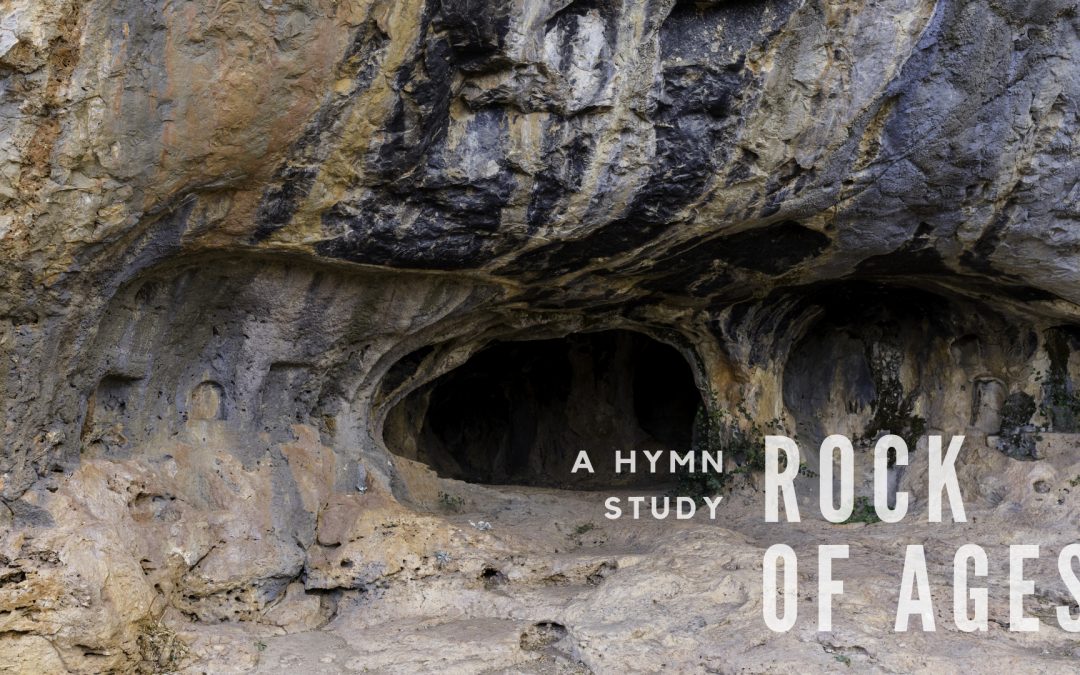The lyrics of this old, familiar song are attributed to Augustus Toplady, circa 1775. Toplady was
at one time a very close friend of John Wesley. However, he disagreed strongly with Wesley’s
Calvinistic doctrine, and their relationship degenerated to the point of open criticism and public
opposition. He wrote an article for a London-based religious paper, in which he attempted to
calculate the number of sins a man could commit in a lifetime. The thrust of the article was the
impossibility of repaying God for our salvation.
Though the exact title phrase, “Rock of Ages” is not to be found in the King James Bible, the
concept of Jesus the Christ being our source of strength, protection and salvation is conveyed in
Isaiah 26:4, “Trust ye in the LORD forever; for in the LORD JEHOVAH is everlasting strength.” In
the NJKV translation, the last phrase is rendered, “For in God the LORD, we have an everlasting
Rock.”
First, we look at few words for clarification:
- Cleft—a space or opening, a split.
- Languor—a state of being lazy or lethargic.
- Atone—to reconcile for an offense, in this case, sin.
VERSE ONE
Just as David hid from the evil intentions of King Saul in the cave of Adullam (I Samuel 22:1),
and fled to the hill country in the wilderness of Ziph (I Samuel 23:14), so too, can we find
protection in the cleft of our Rock, the LORD and Savior, Jesus Christ. As we sing verse one, we
acknowledge the total dependency we have on Jesus, and proclaim his saving power, by our
remembrance of the shedding of His precious blood at the hand of those cruel executioners.
”But one of the soldiers with a spear pierced his side, and forthwith came there out blood and
water,“ John 19:34. This outpouring of blood completed the offering of the ultimate, perfect
sacrifice for the sins of mankind for all ages.
This blood is truly a double cure. It can save us from the wrath of God, as Paul writes in Romans
5:9, “Much more then, being now justified by his blood, we shall be saved from wrath through
him.” It also makes us pure; Paul wrote of Jesus who “gave himself for us, that he might redeem
us from all iniquity, and purify unto himself a peculiar people, zealous of good works”, Titus
2:14.
VERSE TWO
As we sing this verse, we admit the helpless situation we find ourselves in without the saving
power of the cross. When we sin, we are guilty of violating God’s law; when we are guilty, we
deserve punishment; the punishment established by the law of God is everlasting death,
Romans 6:23.
In my work as a teacher in high school, I have seen students nearly flood the room with tears
when reprimanded for some type of misbehavior. Some of these tears, I am convinced, were
tears of true remorse, or at least of the fear of punishment. Others, I am equally convinced,
were tears-on-demand, contrived, attempting to obtain leniency from the one sitting in
judgement. Tears of any kind will not, however, diminish God’s view of any sin, or His judgment
on the sinner. Even though we sincerely and feverishly work in this work for the cause of the
LORD from before daylight breaks until after darkness falls, we still cannot work off the guilt of,
or earn the forgiveness for one sin. Romans 5:18, “Therefore as by the offence of one judgment
came upon all men to condemnation; even so by the righteousness of one the free gift came
upon all men unto justification of life.” We can pay fines for overdue library books and parking
tickets; we can donate land for meeting houses to be erected, give money to those truly in
need, or for any other good cause, but we do not have enough of anything material to pay the
penalty when we sin: forgiveness of sins is a gift of grace, unmerited favor. The only way for
grace to be grasped is through our obedience to the Gospel, Romans 5:1-2.
VERSE THREE
In this final stanza, we take ourselves to the closing view of our life here on this earth. As we
leave this world in physical death, and rise to the heavenly scene, we see the Christ sitting on
His throne. “Looking unto Jesus the author and finisher of our faith; who for the joy that was
set before Him endured the cross, despising the shame, and is set down at the right hand of the
throne of God,” Hebrews 12:2. We must affirm as Peter did in Matthew 16:16, “Thou art the
Christ, the Son of the living God.” This statement, being the rock-solid foundation of our belief,
reflects our thrust that it is by and through Him, our Everlasting Rock, that we have our hope of
eternal life.
Article by Hugh Bozeman (2018)

